In recognition of Asian American and Pacific Islander Heritage Month, we’re featuring our talented AAPI-identifying employees across the Company. AAPI Heritage Month is a time to reflect, celebrate and recognize the influence of Asian Americans and Pacific Islander Americans in our history, culture and achievements. Here at Atlas, we celebrate our Asian American and Pacific Islander colleagues and their contributions.
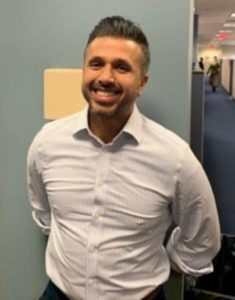
Hassan Hoque, Lead IT Security Analyst.
This week’s employee spotlight is on Hassan Hoque. Hassan has been at Atlas for six years and was recently promoted to Lead IT Security Analyst. In his role, Hassan is primarily focused on protecting the Company’s sensitive data from cyber threats. Ensuring that our operating environment is secure every hour, every day is a big job, but as Hassan explains, “working alongside talented colleagues who are committed to the same vision is how we get the job done.”
Hassan, who’s Bangladeshi, kindly answered a few questions about his career, life and heritage. Here’s a bit more about Hassan in his own words.
What was your career path and how did it lead you to Atlas?
I started my career in financial services. I graduated college with a degree in mathematics, and my first job was at investment banking company, where I worked on the trading floor. After a few years, I started to gravitate toward technology and eventually took a position as a systems engineer. After 15 years at the company, I went to work at a cable news channel as a security and systems engineer.
The aviation industry wasn’t on my radar until a recruiter called and suggested I interview for a position at Atlas. I met with Nate Maurer, who is now my manager, and knew immediately that this was the right next step for my career. It continues to be a fabulous opportunity.
How important is it to you that Atlas recognizes Asian American and Pacific Islander Heritage Month?

Hassan with his wife Safa.
It’s important for Atlas not only to celebrate Asian American and Pacific Islander Heritage Month, but also to recognize the many cultures that contribute to the Company’s diversity. The different ideas and perspectives found within Atlas are what will make our organization thrive. Asian American and Pacific Islander Heritage Month is a great opportunity to learn about other countries and cultures from our Atlas colleagues. I am proud to be part of Atlas’s recognition.
Please share something that is unique about your culture.
One of the things that I would say is different in Bangladeshi or the Asian community is the timing of when children leave the family home to go out on their own. Instead of going out on your own immediately after graduating from college, it’s very normal to continue living with your parents until you get married. That’s what I did. I graduated from college and moved back home to be with my parents. I left when I got married. The family unit is very tight and very close in our culture.
Which traditions are most important to you today? Which ones are you focused on instilling in your children?
Growing up, I read the Quran twice. My parents had a tutor come in at various points while I was growing up to teach me how to read Arabic. Learning how to read the Quran is a really important part of our religion. Now that I have my own children, I want them to learn how to say the prayers – just like my parents made sure I did. So, I am sending my children to Islamic school to learn about Islam, how to do the prayers and the significance of Ramadan. I love that they are following in my footsteps and learning all of this.
What’s a fun fact about you – personal or professional – most people at Atlas don’t know?
I was born in Russia and spent a significant portion of my childhood in Thailand. While both my parents are Bangladeshi, I only lived in Bangladesh for two years. My father was a diplomat and we lived abroad in a number of different countries. We moved to the United States – Queens, New York – in 1989 when I was 13 years old. My parents still live in Queens today.

Hassan with his wife Safa, son Aayan and daughter Anayah.
Do you have a role model or mentor in your life?
I would say it is Nate Maurer, not because he is my boss but because of who he is as a person. Nate has a natural gift that makes people gravitate towards him, especially when he speaks.
His willingness to share his skills, knowledge, and expertise has positively impacted my career and personal life.
From the fields of Colombia to the highways of the U.S., the North American flower market is an enormous system with complex variables and spikes in demand. Flowers are popular year-round in America, especially on days like Mother’s Day in early May.
 Atlas Air plays an integral role in the larger system by carefully carrying flowers from South America to their destinations, whether that be weddings or supermarkets. Atlas Air works hard making sure flowers are kept bright and fresh—and that they arrive on time to lift spirits and make memories.
Atlas Air plays an integral role in the larger system by carefully carrying flowers from South America to their destinations, whether that be weddings or supermarkets. Atlas Air works hard making sure flowers are kept bright and fresh—and that they arrive on time to lift spirits and make memories.
“We’re a small but important part of the supply chain,” said Luis Fernando Del-Valle, Regional Director, Brazil, Colombia & Argentina. “It takes an agent to coordinate it, a farmer to grow it, a trucker to drive it, and, finally, an airline to bring it. And that’s us.”
Transporting flowers is so important because, as the last few years have shown, the flowers are important to Americans. Frank Diaz, Director of Sales and Marketing at Atlas Air, whose job includes forecasting, said he thought that demand for flowers during the pandemic would fall along with hotel bookings and event cancellations.
“I was so wrong… the demand from consumers durin g COVID for flowers was just as big as it ever was,” Diaz said, adding that the pandemic may not have had as great of an impact on demand because people still wanted flowers in their homes. “I was really pleasantly surprised how resilient the flower business is.”
g COVID for flowers was just as big as it ever was,” Diaz said, adding that the pandemic may not have had as great of an impact on demand because people still wanted flowers in their homes. “I was really pleasantly surprised how resilient the flower business is.”
For Diaz, this offered a striking reminder of why the many flower shipment flights that Atlas makes, such as during peak flower holidays like Mother’s Day, are so meaningful.
Del-Valle said the American flower market also supports the farmers who grow them, such as in Latin America. Each Mother’s Day season, Atlas ships over five million kilograms of flowers—including roses, hydrangeas, and carnations—from South America total. Earlier this year, Atlas Air dedicated over 50 flights from Columbia and Ecuador to fly flowers to the U.S. ahead of the Valentine’s Day rush.
“Consumers and shippers are supporting local economies and farms,” Patricio Sanchez, Regional Director, Chile, Ecuador, & Peru, emphasized. “In Colombia, flowers are one of the largest parts of the country’s economy. They’re important for those communities and people.”
In fact, Colombia is the second-largest exporter of flowers in the world. For both Valentine’s Day and Mother’s Day, Atlas Air doubles the number of flights it flies from Ecuador and Colombia.
The main difference between Valentine’s Day and Mother’s Day is temperature: there’s a bit more risk when flowers could be exposed to heat in May. But Atlas Air takes countless precautions to ensure flowers stay as fresh as possible, from the moment they leave the farm until the moment they are in mom’s hands.
Before flowers are loaded onto an aircraft, they must be transported to the airport. To ensure freshness, flowers are transported in refrigerated trucks. Once the flowers arrive, members offload them into large vacuum-like machines that take out moisture to keep them fresh. The cargo is then loaded into coolers, where it’s securely stored at temperatures between two to eight degrees Celsius for the rest of the flight.
Upon landing, the process is reversed. The flowers are unloaded from the aircraft, placed in refrigerated trucks and/or warehouses, then shipped to their final destination.
“If I’m shipping it, I’m supporting it”
Diaz has been involved in the transportation of flowers for over a decade now and has made it a habit to always buy flowers to support the flower market.
“If I’m shipping it, I’m supporting it,” he said.
When asked how his wife reacts to the flowers he brings home, Diaz laughed. “I’ve been at Atlas Air for 12 years. Before, there was a certain reaction to it. Now, if I don’t do it, my family is like, ‘where are my flowers?’”
Interested in a logistics career? Check out our career openings here: https://careers.atlasairworldwide.com/
Ever wonder how that bottle of canola oil ended up in your kitchen cabinet or pantry? Its journey from the market to your home was made possible by over a dozen carefully coordinated flights, fleets of trucks, and a trip that started in Chile, stopped in Miami, and ended in Canada.
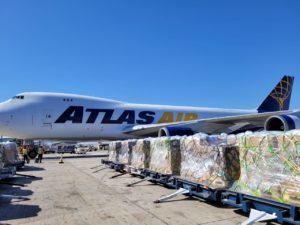
For the past few years, Atlas Air has been a key part of that journey.
During the peak season in 2022, Atlas flew over 2,000 tons of canola seeds from Chile to Miami. The seeds were shipped in massive crates in the cargo holds of Atlas’s 747-400 planes. To provide some perspective, the number of seeds shipped during this timeframe equates to the weight of about 20 single-story houses. The size of the shipments would have filled around 220 Olympic size swimming pools.
“We’ve been shipping canola seeds for many years, but it’s gotten busier with each passing year, and this year has been especially busy,” said Patricio Sanchez, Regional Director of Sales and Marketing, Chile, Peru, and Ecuador at Atlas Air.
“Part of the reason it’s busier is because it’s been a really strong season for canola seeds. There’s been more production and greater output than previous years. Also, many seeds have traditionally been transported on commercial flights that simply aren’t flying right now. As a result, we’re doing a record 16 flights this year just to ship canola seeds,” said Frank Diaz, Director of Sales and Marketing at Atlas Air.
Ground crews load the seeds in oversize crates onto our planes, which then transport the seeds to Miami. From there, the seeds are transferred into cargo trucks
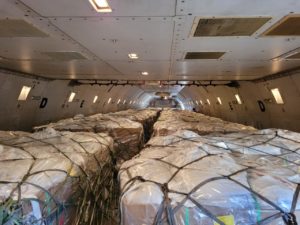 that transport the seeds to their ultimate destination, Canada, the leading country for canola oil production.
that transport the seeds to their ultimate destination, Canada, the leading country for canola oil production.
At the conclusion of each seed season, Atlas assesses how the shipments went and looks for ways to improve efficiency.
“It’s about volume management and making sure the large amounts of seeds get to where they need to be on time,” explained Arian Castellanos , Regional Manager, South America Ground Ops, for Atlas Air.
Canola seeds aren’t the only product that Atlas flies from Chile. Through close and growing partnerships with international shipping companies, Atlas also ships cherries in the winter and salmon on a year-round basis.
“Even as we finish the export of canola seeds, we’re already looking forward to August when we will begin importing corn seeds,” said Fernando Munoz, Country Manager, Chile, for Atlas Air.
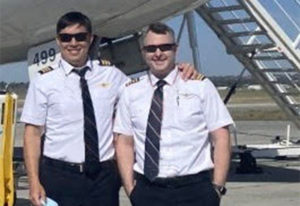
(L-R) First Officer Danny Taylor and Captain Chase Ross.
The last time Atlas 767 Captain Chase Ross and 767 First Officer Danny Taylor piloted a flight together, they were earning their wings in the U.S. Army flight school.
Recently, the two veterans reunited for the first time since those training days on a flight from Portland, Oregon to Riverside, California – their first flight together for Atlas Air.
Chase and Danny met in flight school almost a dozen years ago.
“We were in the same primary class,” said Chase. “We did all of our training together, starting with initial rotary, then instrument and then finishing up with combat training.”
Both also learned how to fly Black Hawk helicopters. Danny went on to fly fixed wings (airplanes) and piloted a King Air 200 and the Dash 7.
After 14 years in the Army and National Guard, which included a deployment to Afghanistan, Chase returned home to California and flew for a regional airline. In 2016, he joined Atlas as a First Officer for the 767 and upgraded to Captain in 2019.
Danny spent nine years as an active duty Army aviation officer and was deployed to the Middle East and Africa. After leaving active-duty, his family settled in Texas. He joined Atlas in February 2019, after hearing how much his army buddy Chase loved working for the Company.
“I was looking to move into the civilian world and reached out to Chase to hear about his experience. He had great things to say about Atlas, and so I decided to apply,” said Danny, who continues to serve in the Reserves. “I was thrilled when they offered me a First Officer position on the 767.”
Chase said “This job is a lot of fun; it’s the best in the aviation industry. We get to fly all over the world, carrying all kinds of cargo as well as the military, which is an honor.”
In fact, one of Chase’s favorite moments as an Atlas Crew member was during a charter flight he piloted in 2017 transporting troops overseas to the Middle East. When he landed, he realized that some of the troops he was flying were the same soldiers with whom he deployed when he flew helicopters for the Army in Afghanistan.
“It was a true full-circle moment for me,” said Chase.
Reflecting on his reunion flight with Chase, Danny said, “It was great to get to fly together. We only flew one leg, but we are hoping our schedules match up soon, so we can fly together again.”
Growing up in Slovakia, Adriana Cuskova, Manager of Marketing Operations, Polar Air Cargo, was introduced to, and fell in love with, aviation at an early age.
“My father – a military veteran turned police major – loved anything that could fly – and the faster and farther it flew, the more it interested him,” Adriana said. “As a result, I too loved aircraft, space shuttles, anything that could take off.”

Adriana Cuskova
This interest in “taking off,” led Adriana to pursue a number of opportunities that served to broaden her horizons.
After graduating from high school in Slovakia, Adriana participated in a student exchange program, which brought her to Texas. There, she had the opportunity to live with a family, immerse herself in the culture and take classes. When her exchange program ended, Adriana then moved to Prague in the Czech Republic, where she enrolled in an accounting program and also worked at Accenture as a junior accountant for a French client.

Adriana’s love for aviation was fostered at a young age by her dad.
Heeding her father’s advice that she would find opportunity in America, Adriana entered into a U.S. State Department Green Card lottery program for a chance to immigrate. She was thrilled to learn that she had been awarded a Green Card to live and work permanently in the United States. Adriana was given six months to make the move; she decided to take a leap of faith and go for it.
After landing at John F. Kennedy International Airport (JFK), Adriana waited for friends of friends to pick her up from the airport. “We had never met before, and this was before video conferencing was a norm, so we basically relied on a mutual friend to make the arrangements. I arrived with all of my belongings not really knowing a soul in New York City, and they whisked me off to start my new life.”
Adriana enrolled in New York City’s Baruch College to continue her accounting studies; and after a few weeks staying with her new friends, she found a local retail job and her own apartment in the Astoria neighborhood in Queens, New York.
One of Adriana’s new friends worked for Atlas Air, and let her know of some job opportunities at the company. Adriana applied for, and was offered, a role as a Cost Analyst for Atlas Ground Ops, which she accepted. She commuted to Company Headquarters in Purchase, New York and continued her studies at Baruch.

Adriana having fun at the Museum of Flight in Seattle, Washington.
Adriana achieved her Bachelor’s Degree in Finance and Investments and continued to advance in her career, progressing through a series of positions of increasing responsibility at Atlas before transferring to Polar in 2015.
“I love that I get to be close to aviation and apply my finance and process management expertise,” said Adriana. “And, our team is just incredible. Nothing scares me more than a monotonous career or getting stuck in a rut. Our exciting business is the very opposite of that, as we make things happen rather quickly. In addition, throughout Polar and Atlas, we are all motivated by a strong network of leaders and I’m grateful for the culture my manager promotes – one that is all “all hands on deck” to make sure we reach the right decisions with all the relevant information.”
She continued, “My dad was very influential in encouraging me to recognize opportunities, particularly when it came to moving to the U.S. and doing something that was in line with my love of aviation. My mom has always been my biggest fan and supporter, and is why I am the person I am today. In my professional career, I am really motivated by the fearless women throughout Polar leadership who are strong, determined, kind and fun to be around.”

Adriana at the Kennedy Space Center in Florida.
Adriana’s work ethic has not gone unnoticed by her colleagues. She is frequently commended by her peers for her problem solving capabilities, commitment to drive positive change and her ‘roll-up-her-sleeves’ attitude to get the work done.
In her current role, Adriana is responsible for ensuring the cargo management process works smoothly through the company’s cargo management system, which is used by more than 800 Polar and Atlas employees to oversee cargo movements for customers. She is focused on increasing coordination between departments and enhancing platform education so that cargo management is seamless throughout the process.
Regarding her role, Adriana explained, “The move to digitalization is so important. With more systems ‘talking’ to each other and eBookings as the norm, we are taking steps to eliminate obstacles and ensure data accuracy, which is the best way to deliver value to our customers.”
Reflecting on Women’s History Month and her role as a woman in air freight, Adriana added, “My advice to young women thinking about the careers ahead of them is ‘don’t be a one-trick pony.’ It’s good to have a strong skill and leverage it throughout your journey, but be open to learning and doing new things. Not every path is set in stone, find the opportunities that lead to new paths, and find mentors and leaders who empower you to do your best. Also, try things that you aren’t necessarily great at.” Adriana explains that she’s taken up painting as a way to develop a different set of skills.
Adriana also has advice for people in the workplace to become allies and help the next generation: “For people already established in their careers, try to be the person you needed when you were younger – be the mentor, the guide, the support for those who are coming up behind you.”
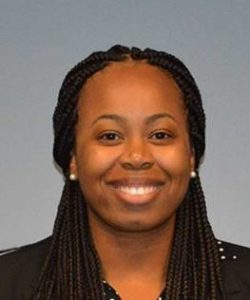
When Human Resources (HR) Director and HR Business Partner Agnes Clarke was 16, she wasn’t flipping burgers or lifeguarding or doing any of the other jobs typical of a teenager first entering the workforce.
Instead, she was gaining professional work experience at a branch office of a multinational consumer bank.
“Growing up, I loved numbers, and I was good at math,” said Agnes, whose early interest in finance led to an internship and ultimately a five-year stint at the bank. “I believed that finance could be something I would enjoy doing.”
She continued to work at the bank after enrolling at Florida International University (FIU) as a full-time student majoring in accounting.
Toward the end of Agnes’s sophomore year, one of her accounting professors shared that he wasn’t convinced accounting was the right path for her.
“He told me I talked too much,” Agnes said, laughing. “He said I was too interested in engaging with people and was worried that accounting might not be the perfect fit for me. And to be honest, I thought he had a point.”
At the time, in addition to working at the bank, Agnes had a paid internship with the accounting professor.
“I was raised by a single mother, who worked very hard to give me every opportunity she could,” she said. “There was no way I was going to put the financial burden of my college education on her. So, it was very important to me that I pivot quickly and line up another paid internship in a field that I was more likely to pursue.”
Agnes reflected on her first interview – with Human Resources at the bank – and remembered being struck by the interviewer’s ability to glean that a candidate would be a great fit for a role based on a conversation. She was intrigued by that skill set and wanted to learn more.
She switched her major to Business Administration with a concentration in HR and transitioned to a Federal Work Study program with FIU’s Human Resources Department.
Upon completion, Agnes was offered and accepted a full-time position in the University’s Human Resources Customer Service Center.
“Working in the Human Resources Customer Service Center was an amazing introduction to HR,” said Agnes. “The questions that I received from callers varied; it always related to some different function of HR. Researching and interpreting policies made me realize that there were multiple areas of focus. I really appreciated the variety the function offers.”
Within a year of working at the HR Customer Service Center, a new opportunity arose at the University’s College of Medicine. She jumped at the opportunity to learn a new industry and gain exposure in the area of recruiting – both doctors and professors.
“It was a brand-new program and felt like a start-up type of culture because I was involved in everything related to HR,” Agnes said. “It was so exciting to immerse myself into a new industry and learn about all the opportunities within medicine, outside the obvious – being a doctor. It’s very similar to aviation in that way; there are so many different career paths available in our industry, but you don’t really know that unless you’re already exposed to it.”
Working in this generalist capacity (learning and executing multiple functions of HR) prompted Agnes to pursue her Master of Business Administration (MBA) immediately after graduating with her bachelor’s degree, so she could eventually work on the corporate side.
In 2015, with her MBA and her Professional in Human Resources (PHR) Certification in hand – and a young, growing family at home – Agnes received a pivotal call from a recruiter.
The opportunity was with Atlas.
“The role sounded perfect,” Agnes said. “It was a little bit of everything – Benefits, Recruitment and more. After meeting with the HR Leadership Team, I fell in love with the company. I knew this was the place for me.”
Today, Agnes has HR responsibilities over all of flight operations – ground and crew. Additionally, as the HR Business Partner, she serves as the liaison between the business and HR, working very closely with Flight Ops leadership to identify and execute strategic initiatives.
Agnes is quick to highlight the significant influence her mother has had throughout her life and on the evolution of her career.
“My mother is my biggest supporter. She has always been a source of inspiration for me,” said Agnes. “She left her family and her entire support system in Haiti to come here to the United States because she wanted a better life for me and my brother, and I have always admired that. It’s not that her life was horrible in Haiti, but she realized there was more opportunity here, and she wanted to make sure we had access to that.
“My mother has always believed in me and encouraged me to do the same and not doubt my ability. Whenever I was overwhelmed and thought I couldn’t possibly finish what I had started she always reassured me that if I had made it this far, I could do it. When I was studying for my MBA, I became pregnant with my daughter. I had awful morning sickness, I was working full time and battling a long commute to and from work. I just didn’t think I could do it all. But my mom told me I could. She always said, ‘This is the hard part. Trust me, things will get easier.’ My mother always had more faith in me than I had in myself, and that always motivated me to keep going.”
Agnes draws inspiration from the other women who came before her. The observation of Women’s History Month – particularly here at Atlas – has opened her eyes to the trailblazers who helped make it possible for her to be in the space she is in right now.
“I fully recognize that where I am today as a woman – a director in a corporate environment that values my voice – is because of the women who came before me and who were brave enough to be disruptors. And I won’t take that for granted. The opportunity before me is such a privilege, and I’m determined to make the most of it.”
As a leader in the global airfreight industry, Atlas Air is known first and foremost for carrying cargo of every shape and size to points throughout the world.
But Atlas transports people, too, and Ground Ops Training Instructor Michelle Cecala is dedicated to ensuring those flights depart and arrive safely and efficiently. She and Ground Ops Training Instructor Tony Kutter focus on the passenger side of training for Ground Ops.
“Most of Atlas’ flights are cargo,” said Michelle. “Tony and I are responsible for training all the PSRs and vendors that work on the passenger flights. Our flights carry the military and all charter flights, which is a huge, ever-changing operation. It’s full of challenges, but I am a problem solver, so I love it.”
Aviation seems to run in Michelle’s family – her paternal grandmother was a flight attendant with Continental Airlines and her paternal grandfather was in sales in aviation. Michelle herself planned for a career working with animals – as a vet tech and working with the Houston SPCA helping with animal rescues. But she eventually found her way to aviation, and it proved to be her true calling.
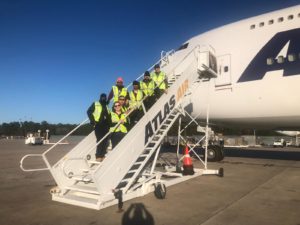
Michelle with the Ground Ops team at IAH.
“My friend was working at UPS in Ground Ops and thought I would enjoy the role,” said Michelle, who still devotes her time to animal rescue. “The job had good hours and great benefits, and even though I had no interest (at the time) in aviation, I decided to apply.”
Michelle’s friend was working at UPS in Ground Ops and suggested she would enjoy the work. So, she applied, was hired, and spent the next few years as a Ramp Supervisor at George Bush International Airport (IAH) in Houston managing Ground Operations for UPS.
“At UPS, we were working the express flights, and it was all about speed and efficiency,” said Michelle. “It was very intense and a quick airplane load, but I loved it.”
UPS leases Atlas 747s to assist with the influx of packages during Peak at IAH, and Atlas is very involved in supporting the operation. It was there that Michelle was first introduced to Atlas and met her future coworkers, including Erik Alba (Senior Manager, Ground Ops Standards and Procedures); Bernie Camino (Ground Ops Procedures Specialist); Marcelo Solis (Ground Ops Procedures Specialist) and Henry Beaumont (Senior Manager, Special Cargo and Load Control).
After three years with UPS, Michelle was ready to grow her career. She saw an open position at Atlas for a Lead Passenger Service Representative (PSR) based in Houston and reached out to Erik.
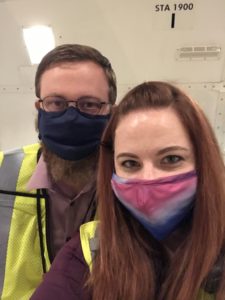
Michelle with IAH MX Manager Austin Wentworth.
“When I called Erik, he happened to be at a Ground Ops conference and was sitting next to the hiring manager,” said Michelle. “I sent in my resume, and the rest is history.”
In April 2018, Michelle took the Lead Passenger Service Representative (PSR) Role with Atlas, a position she held for about a year. She was then promoted to Ground Ops Training Instructor focusing on the passenger side.
“Michelle is a rising star in Ground Operations. She has the unique ability to bring people together within our group and also connect with the other groups, it really exciting to have her as part of the Atlas Team,” said Bob Kiss, Senior Vice President, Ground Ops.
Working in Ground Ops, Michelle is outnumbered by men, but it’s something that has never stopped her.
“I have never been hindered as a woman in aviation,” says Michelle. “I work with so many people across the company, and there is such a supportive culture. I have never felt that being a woman has prevented my career trajectory in any way at Atlas.”
The tradition of aviation in Michelle’s family just may continue with the next generation as she shares her love for the industry with her son and, perhaps one day, with her newborn daughter Aurora, who was born in February. Enzo has visited her during Peak season at IAH, where she works every year as Loadmaster, a role she very much enjoys.
“Enzo has gotten to visit over the years, and the pilots let him come up to the cockpit and give him a tour of the plane,” said Michelle. “Even though Peak is very busy and challenging, I love doing it. I get to work with a team and enjoy the camaraderie.”
Michelle has some advice for women who may be interested in aviation: Don’t hesitate.
“No one should hold back on going into a career in aviation,” said Michelle. “If you have the drive and the desire, you can go far.”